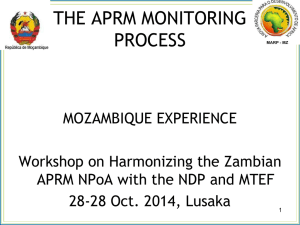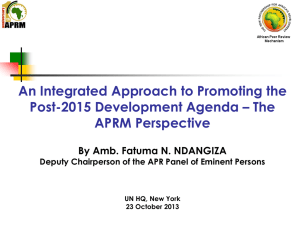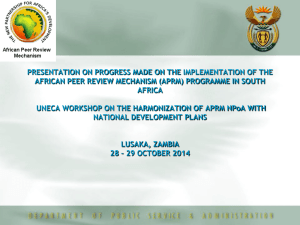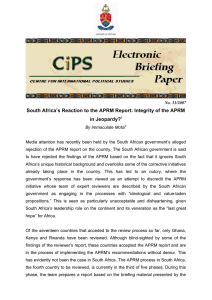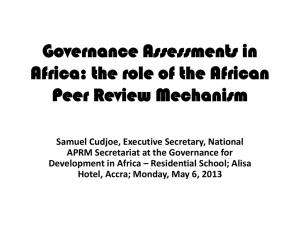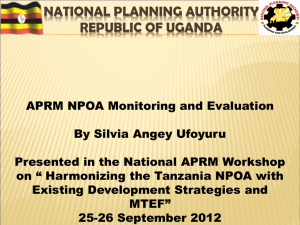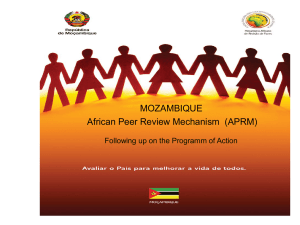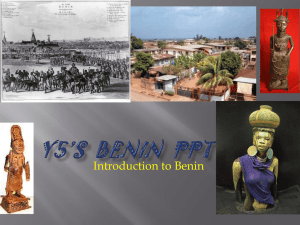THE CASE OF BENIN - United Nations Economic Commission for
advertisement
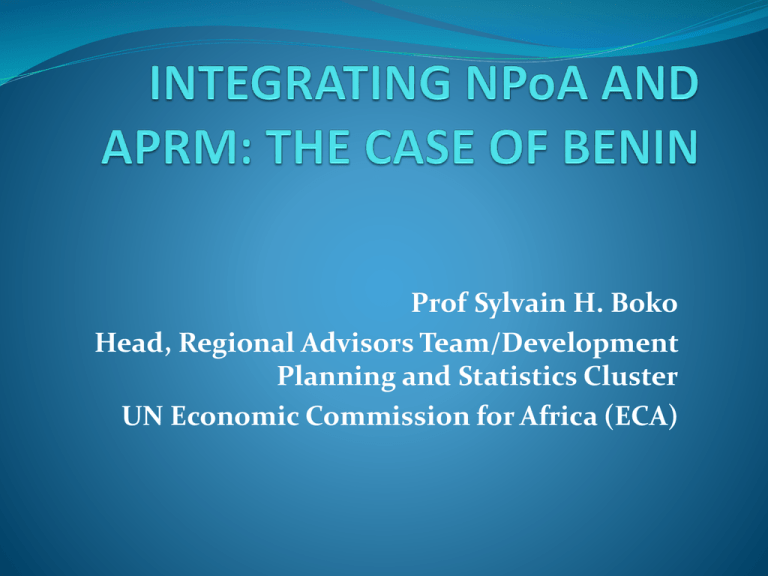
Prof Sylvain H. Boko Head, Regional Advisors Team/Development Planning and Statistics Cluster UN Economic Commission for Africa (ECA) The APRM Imperative Commitment of African Heads of States to eradicate poverty place the continent on a growth and sustainable development trajectory Democracy and Governance at the heart of the African leaders’ and populations’ quest for social, political, and economic renewal Hence the establishment of the APRM mechanism and the signing of the basic APRM documents by the HOSG in Abuja in 2003 The APRM as a Governance Mechanism APRM as a self-evaluation instrument voluntarily adhered to by member states Main Objective: Adopt policies, standards and practices to promote democracy, political stability, economic growth and sustainable development. Thematic Focus include: Political Governance Economic Governance and Management Corporate Governance Socio-economic Development The APRM as a Governance Mechanism Official stages include: Country Self-Assessment and Preliminary National Programme of Action Country Visit by Country Review Team Draft Country Report Prepared and Presented to Gov Final Country Report an Final NPoA sent to APRM Forum and Country Peer Reviewed Country Report officially tabled at regional and sub-regional levels 6 months later Unofficial additional stages include: Institutional Capacity building Harmonizing APRM with Pre-exisiting National Plans Implementation and Monitoring of NPoA Evaluation and Learning from NPoA Corrective Action Peer Learning Benin at a glance Indicators Area Population Population Growth Life Expectancy HDI (2013) 112,673km2 9,983,884 3.20% 61.4 yrs 0.476 Benin Structure of the Economy 6 5 4 3 2 1 0 2002 2003 2004 2005 2006 2007 2008 2009 2010 2011 -1 GDP Growth Rate Share Primary Sector Share Secondary Sector Share Terciary Sector 2012 Benin APRM Progression 0.5 0.3 Accession to MOU 1.7 MOU to NPoA NPoA to Country Review Country Rev to Peer Rev 1.3 Planning and Poverty Reduction Strategy in Benin Initial year: 2000, followed by 2 more generations Outgrown from several strategic studies, including: The National Long-term Perspective Studies The “Benin-Alafia (Prosperity) 2025” National Strategic Development Orientations Latest: Growth and Poverty Reduction Strategy covers 2011-2015 Aligning the Benin NPoA to the GPRS Components of the GPRS: Economic Growth and Transformation Infrastructure Development Human Capital Development Improving the Quality of Governance Sustainable et Equitable Development of the National Space The NPoA was built around the 4th component of the GPRS Aligning the Benin NPoA to the GPRS Benin NPoA Thematic Areas: Democracy and Political Governance Economic Management and Governance Corporate Governance Socio-economic Development Implementing the APRM in Benin 2004: Signature of APRM MOU 2005: Establishing the APRM Independent National Commission to launch APRM Activities (97) 2006: Official Establishment of National APRM Implementation Commission 2009: Establishment of the Current NGC (13) National Focal Point: Ministry of Foreign Affairs 4-member Executive Committee (Chair, First Vice-Chair, Second Vice-Chair, Rapporteur) Implementing the APRM in Benin Technical Committees, each supporting a thematic area through technical studies (Aligned to 4 Technical Research Institutions, or TRIs) Recruitment of a National Coordinator APRM cells installed in all 77 Districts and 6 Provincial Prefectures of the country, insuring citizen engagement and social accountability. In total 631 APRM representatives at the sub national level A focal point in each Ministry and each institution of the Republic Civil Society Media Implementing the APRM in Benin Training of Participants Social Mobilization Exchanges Visits Research (Interim Studies and Reports from RTIs) National Consultations Analysis of Interim TRI Thematic Reports and National Consultation Reports (External experts/resource persons) Seminar to validate interim TRI thematic reports and results of national consultations Releasing the Self-Assessment Report to public validation Finalizing self-assessment report and submission to APRM Secretariat Review Missions and Presentation of the Peer Report Financing APRM/NPoA Implementation Estimated Cost of NPoA: $2.34 bn NPoA as % of GDP: 13 Govt Financing of NPoA: 10% Initial Phase ($500,000): Govt of Benin: $50,000 UNDP: $150,000 ADB: $200,000 ACBF: $50,000 Hans Seidel Fund: $50,000 Financing APRM/NPoA Implementation: Elements of a UNDP et all APRM Support Project Results R1 : Capacity of the APRM CNG and its subnational Components Reinforced and Functional Budget en USD 587 900 R2 : The APRM National Plan of Actions is Known and Appropriated at all Levels 60 000 R3 : The Political and Administrative Constraints to the Implementation of the NPoA are removed 281 000 R4: The Monitoring and Evaluation of the Implementation of the National Plan of Actions is Carried out 683 000 R5 : The APRM is provided qualified personnel and operational means to carry out its mission 4 190 100 APRM Evaluation Reports/Assessments Results Positive impact on citizen’s engagement and social accountability High level of political commitment and support Knowledge of APRM activities around of the country Challenges continue, including: Lack of qualified personnel and capacity at the APRM Secretariat Lack of capacity to support the CNG Misunderstanding between the current national focal point and the CNG Funding Instability THANK YOU!!
